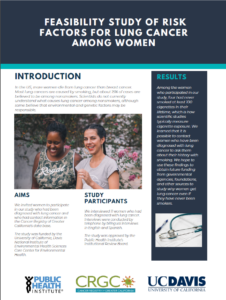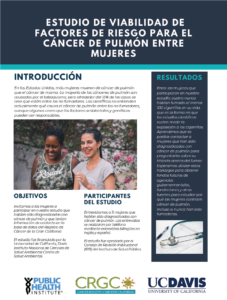CRGC researchers are engaged in a variety of surveillance and research activities utilizing cancer registry data.
Patterns of Care
The Patterns of Care (POC) studies were implemented by the National Cancer Institute (NCI) in 1988 in response to a congressional mandate to report on the dissemination of state-of-the-art therapy into the community. Once a year, the NCI utilizes their Surveillance, Epidemiology, and End Results (SEER) cancer registry program to collect additional diagnostic and treatment information from the populations covered by each of the SEER registries, including the CRGC. The study aim is to evaluate the quality of care in community practice and the diffusion of state-of-the-art therapies into the community setting, with the additional goal of disseminating these findings and providing educational opportunities. NCI selects different cancer sites to study each year.
The CRGC has participated in the SEER POC studies since 2000. Each year, the CRGC staff randomly select about 500 cancer patients in the CRGC area and contact treating physicians to verify radiation, chemotherapy, hormonal therapy, and other therapies used in the treatment of the selected cancers. Additional information is collected on surgery, pathologic margins, tumor characteristics, and hospital and physician characteristics. CRGC staff create fact sheets for each cancer site studied and disseminate to treating physicians (see Factsheets)
RESPOND (Research of Prostate Cancer in Men of African Ancestry: Defining the Roles of Genetics, Immunity and Social Stress):
CRGC is one of 9 cancer registries participating in the RESPOND study: a large, multi-state, cohort study aimed at uncovering the social and biological factors that are related to prostate cancer aggressiveness in African American men. African American men are more likely to develop prostate cancer than any other racial or ethnic group, and prior studies addressing this disparity have been limited. CRGC’s role in the RESPOND study will be to recruit nearly 800 men from its catchment area to participate. Participation includes completing a questionnaire, providing a saliva sample and allowing researchers access to tumor tissue, which is already available from their physicians. This information will then be used by researchers to study how exposure to stress over a lifetime, inherited susceptibility (i.e. genes), and tumor characteristics contribute to the development of prostate cancer and aggressive disease. Doing so will lead to more effective interventions for preventing the disease, reducing late-stage diagnosis, and developing novel treatment strategies for African American men. For more information about RESPOND, visit http://www.respondstudy.org/.
Feasibility Study on Environmental Risk Factors for Lung Cancer Among Hispanic/Latina Women in California:
CRGC is conducting a feasibility study aimed at identifying environmental risk factors for never smoker Hispanic women with adenocarcinoma of the lung in California. Risk of lung cancer among never smokers is not well understood and prior studies of this topic have produced conflicting results. Added to these challenges is the difficult task of identifying a large group of lung cancer patients who are never smokers, particularly because cancer registries do not consistently collect smoking history. The purpose of this pilot project is to assess the feasibility of using the cancer registry to identify lung cancer patients who are likely to be never smokers, and to assess the feasibility of using a telephone interview to identify these patients’ exposure to environmental risk factors. A secondary aim for this study is to determine the feasibility of using registry data to identify and interview recently diagnosed cancer patients.
Lung Cancer Newsletter – English Version:
Lung Cancer Newsletter – Spanish Version:
VTR (Virtual Tissue Repository) Pilot Study:
CRGC has been participating in the SEER Virtual Tissue Repository (VTR) study since 2015. The aim of this study is to identify best practices for a scaled virtual biorepository to support contemporary cancer research questions. Biospecimen collection is becoming increasingly important in cancer research, especially with advances in screening and treatment. The aim is to utilize the registry as a resource for organizing the collection of biospecimens in an efficient and confidential manner. This initial pilot has focused on two important clinical outcomes representing extreme survivors: (1) breast cancer patients with localized node-negative disease who died within 2 years of diagnosis, and (2) long-term (> 5 years) survivors of pancreatic adenocarcinoma. CRGC’s role in this study has been as an intermediary between the researchers and the biospecimens, providing access to deidentified tissue for researchers as well as detailed annotations for each cancer case.
Health-Related Quality of Life in Older Women with Gynecologic Cancer: A Population-Based Analysis Using the Surveillance, Epidemiology, and End Results – Medicare Health Outcomes Survey (SEER-MHOS)
Cancer patients often experience significant physical and mental problems that negatively impact their health-related quality of life (HRQOL). While HRQOL is becoming an increasingly important part of cancer research, relatively little is known about HRQOL in older women with gynecologic cancers. CRGC sought to investigate HRQOL in these women using the SEER-MHOS data resource, which links cancer data from the SEER program of population-based cancer registries with data from the Medicare Health Outcomes Survey (MHOS) of Medicare Advantage Organization enrollees. This project had three main objectives: 1) to assess the impact of depressive symptoms on HRQOL in older women with gynecologic cancer, 2) to evaluate pre- to post-diagnosis changes in HRQOL in older women with gynecologic cancer, and 3) to examine the association of HRQOL measured before cancer diagnosis with survival in older women with endometrial cancer. Together, these studies provide evidence of the significant impact that gynecologic cancer has on both physical and mental aspects of HRQOL, demonstrate the value of patient-reported outcomes in cancer research, and underscore the need for tailored interventions to reduce pain and provide support for older women with gynecologic cancer.
Validation of Patient Reported Outcomes Measurement Information System (PROMIS) in Diverse Cancer Populations
CRGC researchers, in collaboration with Georgetown University and three other Surveillance Epidemiology and End Results (SEER) regions, are using cancer registry data to evaluate the usefulness of PROs (patient reported outcomes) among diverse cancer patient populations. Surveys of approximately 4,000 cancer patients in the Greater California regions have been conducted for this study and treatment information will be abstracted from a sample of their medical records.
Adolescent and Young Adult Experience of Care
This study was designed to help us understand how best to obtain consent, collect medical records, and survey a population-based sample of recently diagnosed adolescent and young adult (AYA) cancer patients. Surveys aimed to address these AYA cancer patients’ experiences with cancer and cancer care. This study was a collaborative effort conducted at multiple Surveillance, Epidemiology and End Results (SEER) regional registries, including CRGC, with an overall goal of enrolling 530 AYA patients aged 15 to 39 years at time of diagnosis. The Cancer Registry of Greater California (CRGC) aimed to enroll a total of 70 patients. Cancer sites included were: acute lymphoblastic leukemia, germ cell tumors, Hodgkin’s and non-Hodgkin’s lymphoma, and sarcomas – including osteosarcoma, Ewing’s sarcoma, and rhabdomyosarcoma.


